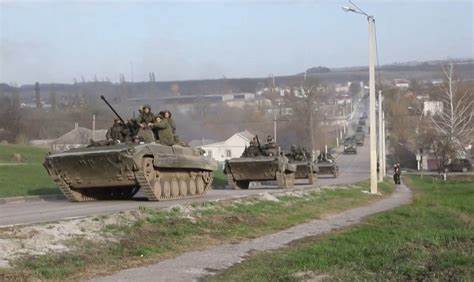Ahead of a Tuesday meeting between the US and allies over sending more arms to the war-torn Ukraine, Russia has warned of the “real” threat of World War III breaking out.
Moscow’s invasion of its neighbor has sparked an outpouring of support from Western nations, with arms being shipped in to assist the country in fighting Russian forces.
Western powers, on the other hand, have been wary of deepening their engagement for fear of inciting a clash with nuclear-armed Russia.
Sergei Lavrov, Moscow’s foreign minister, told Russian news agencies that the prospect of a third World War “is severe” and criticized Kyiv’s approach to the stalled peace talks.
“It’s genuine, and you can’t ignore it,” Lavrov added.
President Volodymyr Zelensky has been requesting heavy weapons from Ukraine’s Western allies, notably artillery and fighter jets, for months, claiming that increased firepower would allow his soldiers to shift the tide of the conflict.
Despite Moscow’s protests, the appeals appear to be resonating now, with a slew of NATO members committing to contribute a variety of heavy weaponry and equipment.
Pentagon head Lloyd Austin and Secretary of State Antony Blinken met with Zelensky in Kyiv over the weekend and promised $700 million in additional help to Ukraine.
“Believing that you can win is the first step toward victory,” Austin told a group of media after meeting with Ukraine’s president.
“We believe we can win – and they can win – if they have the necessary equipment and support,” said the team.
On Tuesday, 40 countries will meet in Germany at the invitation of the US for a security meeting to discuss additional armaments for Ukraine, as well as ensuring the country’s long-term security once the war is finished.
Among the invited countries are the US’s European allies, as well as Australia and Japan, who are concerned that a Russian win in Ukraine could set a precedent and boost China’s territorial ambitions.
Finland and Sweden, both traditionally neutral countries who have been considering joining NATO in the aftermath of Russia’s invasion of Ukraine, are also invited.
But, far from the diplomatic frenzy, citizens continue to perish in the violence that rages across the war-torn Ukraine.
On Monday, a Russian rocket strike on railway infrastructure in the Vinnytsia region of central Ukraine killed at least five persons and injured another 18.
Alexander Kamyshin, the chairman of Ukraine Railways, had disclosed the strikes earlier, accusing Moscow’s forces of “systematically” damaging railway infrastructure.
Earlier this month, Russian strikes on a train station used for evacuations in the eastern city of Kramatorsk killed dozens of civilians.
Kharkiv, Ukraine’s second city, is still partially surrounded, and Russian forces are regrouping in the south, according to the ministry. However, a Russian attempt to break through to Zaporizhzhia in the east failed.
Children in Kharkiv, which has been subjected to daily Russian rocket assaults since the conflict began more than three months ago, spoke to AFP about the bombs, their daily lives, and their aspirations for peace.

